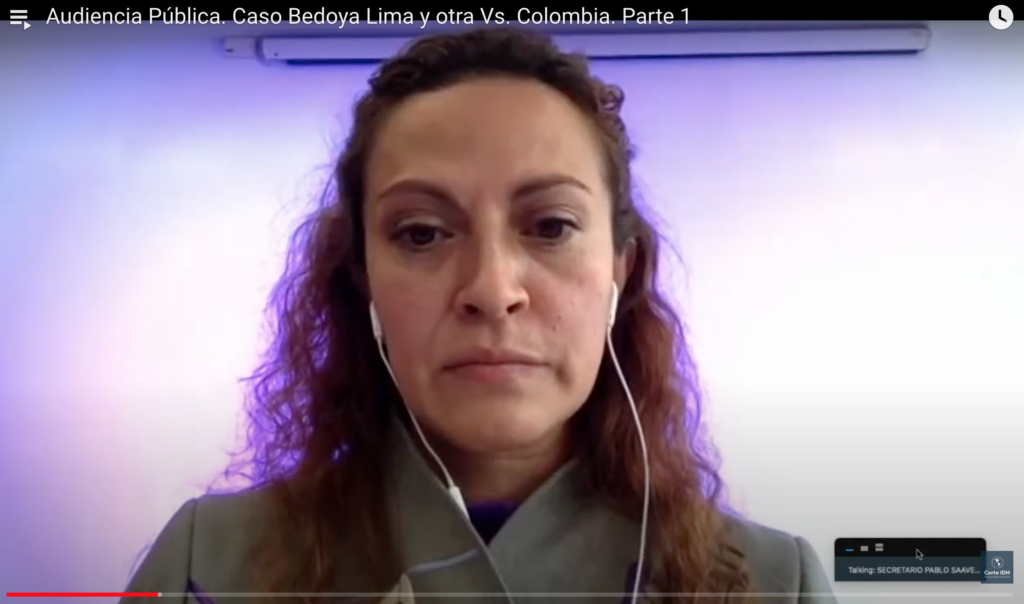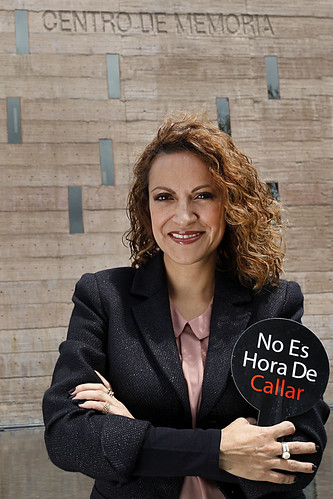In what has been cataloged by various experts as "re-victimizing,” "unprecedented," and even "shameful," the Colombian State withdrew from a virtual hearing held by the Inter-American Court of Human Rights (I/A Court H.R.) regarding the abduction, torture and sexual assault of Colombian journalist Jineth Bedoya Lima in 2000.
“The criminals have wanted to silence me all these years and the State today intends to do the same. Withdrawing from the trial before the @CorteIDH shows that it does not have the slightest intention for justice to be done in my case and in cases of sexual violence," Bedoya Lima wrote via Twitter.
The journalist’s outrage was not surprising. The first day of the hearing had just gotten underway and after a statement by Bedoya Lima, the National Agency of Legal Defense of the Colombian State, led by Camilo Gómez, pointed to a "lack of procedural guarantees" due to an alleged lack of impartiality of five of the six judges of the Inter-American Court. He also indicated that he would file a request for disqualification and requested that the hearing be suspended immediately. Given the refusal of the president of the Inter-American Court, Judge Elizabeth Odio Benito, the State withdrew. The witness that the State had offered and that was scheduled to testify the first day of the hearing did not appear either.
In the perception of the State representatives, “the interventions and questions of the judges showed evident prejudices and involved new issues that were not even debated before the Inter-American Commission on Human Rights (IACHR),” according to a statement published on March 15.
However, some experts in the Inter-American Human Rights System have pointed out through social networks that the attitude taken by some judges is not strange and that it shows solidarity with a person who is the victim of a crime, such as Bedoya Lima.

Jineth Bedoya Lima durante el primer día de audiencia ante la Corte IDH 15 de marzo de 2021. (Screenshot)
“Solidarity with suffering, whatever expression is used, does not mean that the State is responsible for said suffering, which is precisely what is at trial,” wrote Catalina Botero, who was Special Rapporteur for Freedom of Expression of the IACHR from 2008 to 2014. “The solidarity expressed by some judges does not imply a prejudging of the matter under trial, in the same way that the solidarity expressed by the State does not imply recognition of responsibility. This position of the State is at least inconsistent.”
Silvia Serrano, a lawyer with experience in the Inter-American Human Rights System and who served as Coordinator of the IACHR's Case Section, the team in charge of all work before the Inter-American Court, spoke along the same lines.
“It is true that some judges from @CorteIDH expressed solidarity and appreciation to @jbedoyalima for the violence and subsequent struggle. Are these basic expressions of humanity a sign of a lack of impartiality?” Serrano wrote via Twitter.
“Some judge described what happened to [Bedoya Lima] as‘ aberrant,’ but that violence has not been unknown to the State. In fact, before the IACHR, the State recognized the violence suffered by [Bedoya Lima] and rather tried to defend the actions of the internal authorities,” Serrano continued. “So, if the controversy before @CorteIDH is about state responsibility but there is no doubt about the violence suffered by @jbedoyalima and they recognize her struggle, what is the problem of a judge saying that this sexual violence is aberrant? I doubt that the State thinks differently.”
International organizations such as the Committee to Protect Journalists (CPJ) and the IFEX network also expressed their rejection of the Colombian State’s attitude.
“The Colombian government’s decision to effectively stomp out of the Inter-American Court hearing shows the authorities’ shocking disregard for the violence inflicted on Jineth Bedoya, and is a slap in the face to every Colombian journalist — especially women journalists — fighting impunity,” said Natalie Southwick, CPJ Central and South America Program Coordinator. “If the Colombian government cannot accept responsibility in Bedoya’s case, what hope does any other journalist have of seeing justice? Instead of picking procedural fights, the Colombian government should take this opportunity to set a regional example and return to the proceedings immediately.”
The Press Freedom Foundation (FLIP, for its acronym in Spanish) of Colombia, one of the entities in charge of Bedoya's defense, pointed out that the State is re-victimizing and preventing Bedoya Lima's access to justice. It called on the State to fulfill its international obligations.
“As organizations that represent Jineth Bedoya, we denounce the State’s attitude in this case, which demonstrates the State’s indifference to the victims of sexual violence during Colombia’s armed conflict and denies dignified spaces for access to justice. Colombia’s decision to leave the public hearing is unprecedented and gives cause for concern about its commitment to justice for human rights violations and its eventual compliance with the decision of the Court,” FLIP wrote in a statement. “Moreover, we denounce this action as part of a strategy to delegitimize the Inter-American Court and create new obstacles in this process, which continues to punish Jineth Bedoya for making her voice heard. This is a new attempt to silence her.”
A painful story: 20 years of impunity
Despite the attitude of the State, the voice of Bedoya Lima was heard. For an hour and a half, the journalist recounted not only her crime, but the events that preceded it and the situation in which she has had to live from that moment to date. A life full of threats and impunity, in which journalism has become a lifeline, although she acknowledged that doing it that way is "humiliating."
Bedoya Lima's statement began by explaining what her journalism had been devoted to and the different investigations she had carried out on crimes committed inside the country's prisons. Due to these investigations, she received several threats and even an attack in which the journalist's mother was also a victim.
She also said that on May 25, 2000, she went to the La Modelo Prison in Bogotá to interview a paramilitary member after the police suggested it as a measure to calm the threats. "Unfortunately, it was a trap," the journalist said.
That day, in front of the prison guard and a police car that was there, according to Bedoya Lima, she was approached by a woman and a man who abducted her and took her on a “long journey” that ended in a "mass rape" and that later they left her "almost dead" on a highway in the country.
"On different occasions they stated that it was an example to the press," Bedoya Lima told the Inter-American Court. "That we were getting into things we shouldn't, that the real plague was not them but the journalists, and that this was a lesson to the press."

Jineth Bedoya Lima created the campaign "It's not time to be silent" in 2009 to fight violence against women. (Photo: Courtesy of El Tiempo)
"I know my life is still at risk," Bedoya Lima said. “The day after the case was accepted by the Court, I received a call that did not come from Colombia, but from another country, where they told me things related to the rape. If I wasn't able to shut my mouth, I already knew what to expect.”
The journalist also stated the threats to which her mother is victim and the circumstances in which her life has also been affected. She added that she has had to testify 12 times before the Colombian Prosecutor's Office in an act of revictimization. In fact, the Colombian State recognized this problem.
“Colombia recognizes its responsibility for having collected 12 declarations of @jbedoyalima in the framework of the criminal process, making her go through this painful situation so many times," wrote Camilo Gómez, Director General of the National Agency of Legal Defense of the State.
Bedoya also requested provisional protection measures for herself and her mother. “Speaking here in this Court today is obviously going to bring about more security issues and perhaps more threats and more intimidation. I learned that I am never going to silence myself again, but I ask the honorable court to take that into account, to take into account my safety and that of my mother.”
“Being someone's voice is a very big responsibility, but empowering someone's voice I think is the greatest honor that as a human being I can have. And that is what I understand today, being here in front of you, madam president, gentlemen co-judges, that empowering the voices of all those women, all those girls who have faced one of the worst violent acts that a human being can face, is a privilege, it is a responsibility, but it is also a great opportunity to make a State understand that pain can be transformed," Bedoya Lima said. "I no longer have anything to lose and I do have a lot to gain [...] I will continue to put my pieces together and the only thing I can do is for life to give me enough strength to be able to help other women who have also survived this terrible crime."
In 2009, Bedoya created the campaign “No es hora de callar” (It is not time to shut up) with the objective of getting women victims of violence to report it. She has also worked with victims of the country's armed conflict.
In a March 16 statement, the Inter-American Court announced the temporary suspension of the hearing.
For crime against Bedoya Lima, only three people have been convicted as material perpetrators. There are no investigations against intellectual authors or members of the State who are allegedly involved.